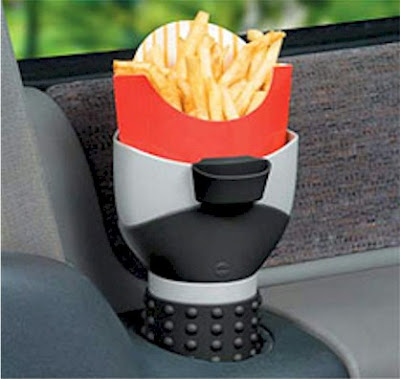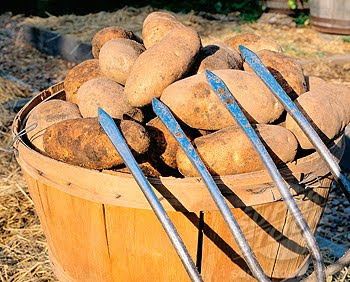
So…yesterday, Amari and I made a run to Babies R Us to purchase a child safety gate for her baby sister. On the way home, I veered into the rearview mirror after hearing a light smacking noise to see my two year old picking French fries out of her car seat and eating them. When I abruptly asked her, "Amari, why are you eating old French fries, no no!" She then said, "because I children mommy!"

It had me thinking…why do kids enjoy potatoes so much? Amari was not eating the Cheerios or apple skins that she often spits out. There was something about those once crispy starches that invited her to taste again, no matter the concern that it may cause stomach trouble.
Whether mashed, baked or roasted, people often consider potatoes as comfort food. Amari would be quick to agree. They are an important food staple and the number one vegetable crop in the world. Potatoes are available year-round as they are harvested somewhere every month of the year.
I thought I would take this funny, yet disturbing event with Amari to discuss the proper storing and picking of potatoes. Surely, day old French fries out of a car seat is not the way to go!

While potatoes are often conveniently packaged in a plastic bag, it is usually better to buy them individually from a bulk display. Not only will this allow you to better inspect the potatoes for signs of decay or damage, but many times, the plastic bags are not perforated and cause a build up of moisture that can negatively affect the potatoes.
Potatoes should be firm, well shaped and relatively smooth, and should be free of decay that often manifests as wet or dry rot. In addition, they should not be sprouting or have green coloration since this indicates that they may contain the toxic alkaloid solanine that has been found to not only impart an undesirable taste, but can also cause a host of different health conditions such as circulatory and respiratory depression, headaches and diarrhea.

Sometimes stores will offer already cleaned potatoes. These should be avoided since when their protective coating is removed by washing, potatoes are more vulnerable to bacteria. In addition, already cleaned potatoes are also more expensive, and since you will have to wash them again before cooking, you will be paying an unnecessary additional cost.
Since new potatoes are harvested before they are fully mature, they are much more susceptible to damage. Be especially careful when purchasing these to buy ones that are free from discoloration and injury.
The ideal way to store potatoes is in a dark, dry place between 45°F to 50°F between 7-10°C) as higher temperatures, even room temperature, will cause the potatoes to sprout and dehydrate prematurely. While most people do not have root cellars that provide this type of environment, to maximize the potato's quality and storage, you should aim to find a place as close as possible to these conditions. Storing them in a cool, dark closet or basement may be suitable alternatives. Potatoes should definitely not be exposed to sunlight as this can cause the development of the toxic alkaloid solanine to form.

Potatoes should not be stored in the refrigerator, as their starch content will turn to sugar giving them an undesirable taste. In addition, do not store potatoes near onions, as the gases that they each emit will cause the degradation of one another. Wherever you store them, they should be kept in a burlap or paper bag.
Mature potatoes stored properly can keep up to two months. Check on the potatoes frequently, removing any that have sprouted or shriveled as spoiled ones can quickly affect the quality of the others. New potatoes are much more perishable and will only keep for one week. Cooked potatoes will keep fresh in the refrigerator for several days. Potatoes do not freeze well.
Read more at http://www.whfoods.com/genpage.php?tname=foodspice&dbid=48

0 comments:
Post a Comment